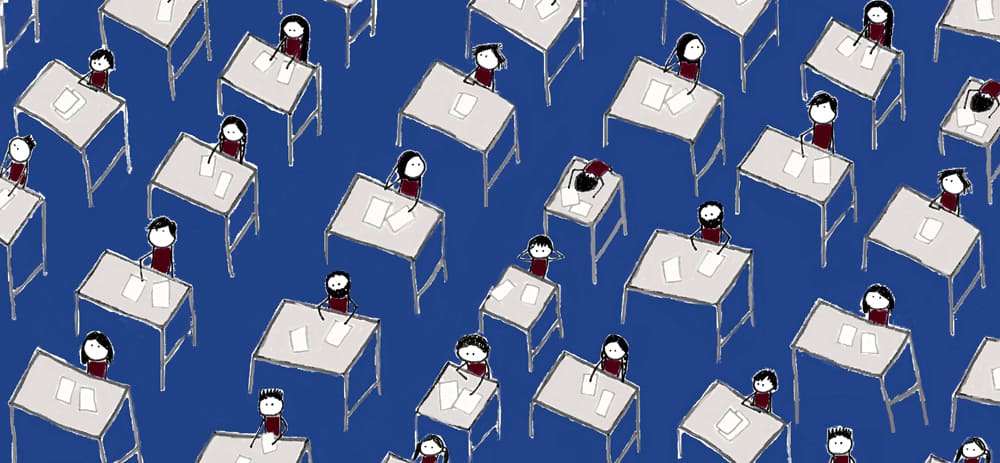The University of Toronto Governing Council Tribunal Panel (University Tribunal) is the judicial body responsible for trying students who have committed serious academic offenses. Anonymized details of the cases and decisions are released publicly, including the assigned penalty. The following is a look at five of last year’s cases.
Case 708: Student suspended and denied credit for copying peer’s incorrect answers exactly
What happened: The student was found to have been conversing throughout a midterm exam of AST201 with a peer. A third student, who was also taking the exam, reported the incident. When the professor investigated the report, she found not only identical scantron sheets, but identical errors on three of the four short-answer questions. The midterm exam was worth only 15 per cent of the final course grade. The student did not appear at the hearing, even after having negotiated a suitable date with the Tribunal.
Result: The student, who was considered a repeat offender for having brought a cell-phone into a previous exam, received a zero in the course, was suspended for two and a half years, and received a notation of the offence on his transcript for four years.
Case 675: Turnitin detects chronic plagiarizer, remorse does not lighten penalty
What happened: After the student submitted an assignment for PHL333, it was found by Turnitin to have marked similarities to a paper submitted at Texas A&M University. The student obtained counsel, and argued her defense by saying that she did not intend to plagiarize, and that she was distracted by family events at the time of submission. Her sincere remorse, as noted by the Tribunal, did not redeem her, as she was a repeat offender.
Result: Since she had previously engaged in plagiarism in other courses, the student’s three-year suspension, mark of zero, and a notation on her transcript were considered by the panel to be equal to the penalties administered for other, similar offences.
Case 697: Student fabricates rough notes in attempt to prove his work’s originality
What happened: Accused of plagiarizing up to 51 per cent of a UTM GGR208 essay, the student printed off supposed sources and highlighted passages, to attempt to prove that he had done background work for the paper. When cross-examined about why the documents had been downloaded long after the essay’s submission, he claimed that he had originally worked from soft copies of the same articles. To the student’s downfall, a witness for his defense had already testified that the documents produced were the same that he had used when writing his essay.
Result: The student was suspended for three years, assigned a mark of zero in the course, and given a transcript notation of his offense. The tribunal noted that the student’s situation was made more serious by his attempt to deny the plagiarism.
Case 713: Student impersonates two doctors to try to get out of exam on April 19 and 30, but wrote two others on April 25, 27
What happened: The student submitted a petition for deferred exams, with the support of two doctor’s certificates. Damon Chevrier, St. Michael’s College registrar, was unsatisfied with the language in the doctor’s submissions, which referred to the student’s illness as a “non life-threatening cold” and the suspicious circumstances that made the student too unwell to sit exams on April 30, but not the 25 and 27. One of the doctors was determined by Chevrier to be a non-existent doctor at a made-up clinic. The other supposed certificate writer, Nernia Garcia, had no recollection of the letter, and confirmed that the signature given was a fake.
Result: The tribunal recommended that Governing Council to expel the student. Pending this decision, the student was suspended for five years.
Case 648: Student brings midterm papers into final exam, claims it was an unrelated booklet from a different course
What happened: In this case, everyone agreed that the student was in possession of a midterm booklet during his final POL310. What the Tribunal had to decide was whether the booklet was a relevant unauthorized aid, as the university claimed, or an unrelated POL 366 booklet, which the student claimed he happened to have with him at the time.
However, before the end of the exam, the student grabbed the booklet, and ran from the exam centre, avoiding campus police. The complicated testimony that ensued included the feasibility of the student taking the bus to the exam, drugs he may or may not have taken on that day, and friends he may or may not have met prior to the exam sitting. Inconsistencies in the student’s story led the panel to believe that the booklet was in fact an unauthorized aid.
Result: With no previous disciplinary record, the student received a mark of zero in the course, a three-year suspension, and a four-year notation on his transcript.


